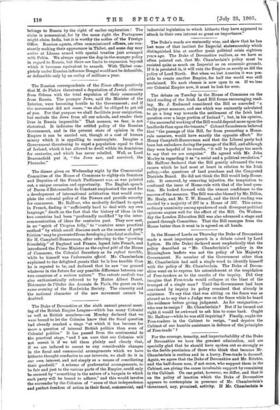The dinner given on Wednesday night by the Commercial Committee
of the House of Commons to eighty-six Senators and Deputies of the French Parliament was, as was pointed out, a unique occasion and opportunity. The English speech Of Baron d'Estournelles de Constant emphasised the need for a development of international arbitration that would com- plete the colonial policy of the Powers and provide security for commerce. Mr. Balfour, who modestly declined to speak in French, finding it " sufficiently hard to deal with my own language," dwelt on the fact that the history of ideas in the two countries had been "profoundly modified" by the inter- communication of ideas for centuries past. They now met, in no " spirit of Utopian folly," to "contrive some practical method" by which small diseases such as the causes of petty friction " may be prevented from developing into fatal m alad i es:" Sir H. Campbell-Bannerman, after referring to the " growing friendship" of England and Fiance, lapsed into French, and introduced the Prime Minister as the enfant gate of the House of Commons, the Colonial Secretary as its enfant terrible, `while be himself was V adversaire bffieiel. Mr. Chamberlain explained to the delighted guests that be is less terrible than he is reputed to be, and declared that he saw " no ground whatever in the future for any possible difference between our two countries of a serious nature." The entente cordials was also enthusiastically referred to by Maitre Albert Danet, taitonnier de l'Ordre des Avocats de Paris, the guest on the same evening of the Hardwicke Society. The sincerity and the national character of the new movement cannot be doubted.






































 Previous page
Previous page